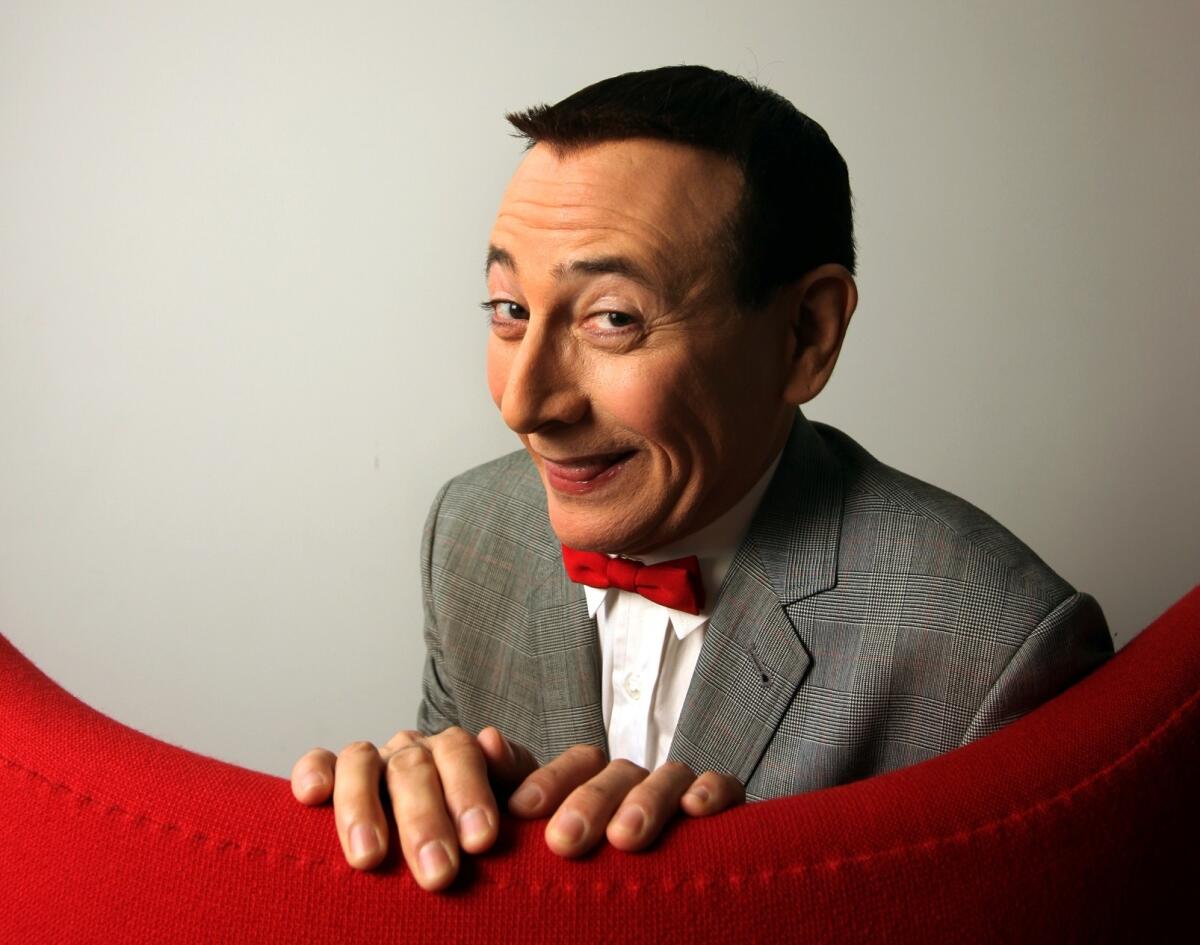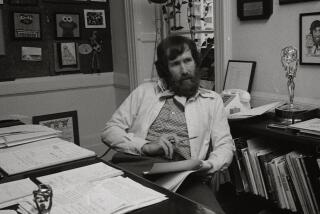Paul Reubens is gone. Why Pee-wee Herman is destined to live on

Paul Reubens has left the Earth, riding a sporty red-and-white bicycle into that Puppetland from whose bourn no traveler returns, but leaving us with his great creation and alter ego: Pee-wee Herman.
As an actor with many, diverse credits — he was most recently seen onscreen in “What We Do in the Shadows,” “The Conners” and Steven Soderbergh’s “Mosaic” and was Emmy-nominated as a guest actor for a recurring role on “Murphy Brown” — there was more to Reubens, who died Sunday at age 70, than Pee-wee. But there was no more to Pee-wee than Reubens, who thought him up, lived inside him and made him run. (Though I suppose, in some sense, Pee-wee might have told Reubens where he wanted to run.)
Pee-wee was a local celebrity before he was catapulted to national celebration via “Pee-wee’s Big Adventure” in 1985 — which also gave director Tim Burton his first feature — and television’s “Pee-wee’s Playhouse” the following year. (My own familiarity with Reubens began when he starred in my friend Randy Akerson’s California Institute of the Arts film thesis, “The Beat Scene,” as an angsty beatnik who would run out into streets at night to find a dark corner to scream in.)
Some will have seen the character emerge from the primordial soup at the Groundlings. Many more, myself among them, in its deluxe expanded version at the Roxy, in 1981: “The Pee-Wee Herman Show,” a breathless take on the hosted children’s shows that would have been intimately familiar to kids of Reubens’ generation, and the generations immediately preceding and following. (Many, many more will have seen that show, recorded for posterity by HBO, on television.)
Paul Reubens, the actor best known for portraying the character Pee-wee Herman before arrests temporarily derailed his career, has died. He was 70.
When “Pee-wee’s Playhouse” debuted on CBS, a live-action children’s series in a Saturday morning lineup otherwise occupied by largely uninspiring cartoons, it was an anomaly, a throwback, even as it looked ahead, in its subversive openness to difference and inclusion, to the future. With its sharp-edged, neon-bright, tertiary-colored, handmade, homemade, paint-splattered aesthetic; designs by puppeteer-artist Wayne White and artist Gary Panter, who had worked the Roxy show and drew the posters and handbills that proliferated around town; and music by Devo’s Mark Mothersbaugh, “Playhouse” embodied a new-wave sensibility, as if all the best shops on 1980s Melrose Avenue (where the Groundlings theater still sustains) had been compressed into a single setting.
Like many idiosyncratic characters or outsider artworks — and Reubens was not averse to describing his creation as a work of art — Pee-wee has the quality of seeming marginal, even as he is massively mainstream, like the band you used to see in crappy little clubs and are surprised to learn sells millions of records and fills stadiums.
Anyone halfway familiar with the character might draw him on command: red bow tie; gray suit, a little too small, in a way that later became oddly fashionable; white socks; hair cropped so close it appears to be painted on. Many among us will have had cause to ape his “Tequila” dance, to have made a joke about the Alamo basement, chanted “Mekka-lekka hi mekka hiney ho!” or remarked on their friends’ ”big but.” When “The Pee-wee Herman Show,” a retooled revival of the Roxy show, opened on Broadway in 2010, after a successful run in Los Angeles, advance sales amounted to more than $3 million. (HBO, back again, ran it as”The Pee-wee Herman Show on Broadway.”)
That there were dark patches in Reubens’ life that caused temporary caesuras in his career is not completely out of tune with Pee-wee, who was not without a dark side — which made him, after all, more relatable, interesting and hilarious to the children of all ages who made up his audience.
An authority figure who was also a case of arrested development, Pee-wee was an overgrown peer who might also prove a role model. It is the job of the revolutionary to redefine what’s normal, if not to demolish the very idea of normalcy. Pee-wee spoke to the outsider in us all. “I’m a loner, Dottie, a rebel,” runs a line from “Big Adventure,” quite possibly the first words that occurred to you on hearing of Reubens’ passing.
In Sunday’s Calendar section, I wrote about the sparkling new reconstruction that is “Pee-Wee’s Playhouse: The Complete Series” (Shout Factory), which not only puts this crazy diamond of a series on to Blu-ray for the first time but has been assembled from the original 16mm film elements — something even the original series, put together on videotape, didn’t do.
Pee-wee was in and out of Reubens’ life over the years. Between the Roxy show and accompanying HBO special and the premiere of “Playhouse,” there were multiple Pee-wee appearances on “Late Night With David Letterman”; a spot opposite Morgan Fairchild on “Evening at the Improv”; a Pee-wee-esque interpretation of Pinocchio, with Carl Reiner as Gepetto, as part of Shelley Duvall’s wonderful Showtime series “Faerie Tale Theatre”; and “Saturday Night Live,” which Pee-wee guest-hosted.
In 1991, after “Playhouse” had gone off the air, and in the wake of Reubens’ much publicized arrest in Florida, Pee-wee opened the 1991 MTV Music Awards to rapturous cheers and pumped fists. (“Heard any good jokes lately?”) Following “Big Adventure,” on the big screen there was “Big Top Pee-wee” in 1988, followed after nearly 30 years by the Netflix feature “Pee-wee’s Big Holiday,” produced by Judd Apatow. In this century, there were appearances on Scott Aukerman’s “Comedy Bang! Bang!” and “WWE Raw.” “Playhouse” was rerun on Comedy Central and Adult Swim. Reubens always stayed invisible.
“I occupy this unique place in some people’s childhood,” Reubens told me when we spoke in 2014, “where there was a point in time where I influenced them in some way. I don’t want to get corny on you, but I am kind of corny, and that’s one of the greatest things about my career, I get this incredible feedback from people all the time. When I go out now, someone will come up to me and say, ‘I’m an artist because of you.’ I didn’t really set out to do that, but it’s enormously satisfying.”
It makes sense that Reubens, who had been ill for several years, kept quiet about it. Pee-wee is a sprite, a creature of myth, like Pan — immune to time or decay or serious illness. (He is easy enough to imagine with a cold, but not with cancer.) He cared for the character — who he only ever played, never exploited or mocked — too much to let the cracks show. Sadly, his creator was merely mortal. Paul Reubens is gone. Long live Pee-wee Herman.
More to Read
The complete guide to home viewing
Get Screen Gab for everything about the TV shows and streaming movies everyone’s talking about.
You may occasionally receive promotional content from the Los Angeles Times.








